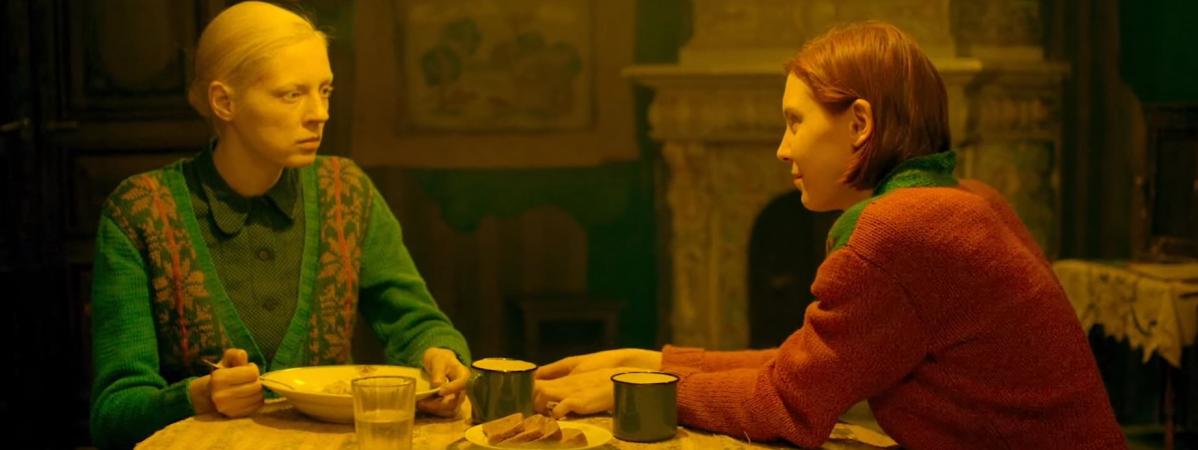By Guy Atoun, Second Year, Law
Beanpole presents a smart, engaging and uncompromising view of Russia in the Second World War, along with technical mastery that shines in every shot.
Beanpole (2019) is undoubtedly a devastating watch. Set in Leningrad in 1945 soon after the end of WW2, it tells the story of Iya and her relationship with other people around her as they all struggle to comprehend the horrific events that just took place in their lives. I went into this movie knowing nothing except having some basic understanding of the setting and the time period in which this film takes place. I highly encourage others to avoid seeing any footage relating to this film, especially if this historical time period aligns with personal interests.
The reason why this is essential here in particular is not only because the events which take place in the film will be far more impactful if they are unexpected, but also because this movie can be easily spoilt by simply mentioning one plot detail.

Shock isn’t necessarily a positive feature in most movies. I try not to love films simply because they shocked me or due to their bizarre nature. I appreciate such films if they are purposeful in their exploration of the specific subject-matter relevant to the film, especially when such subjects are of sensitive nature or tackle historical issues. A clear purpose illustrates the filmmaker’s intentions to produce something meaningful and perhaps leave room for interpretation to let viewers evaluate the film on their own.
This is illustrated in many of Michael Haneke’s films such as Cache’ (2005) and The White Ribbon (2009). As a filmmaker, Haneke is known for his shocking imagery, though anyone who is aware of his ideology with regards to cinema can tell you that there is far more to his films than simply that. Having said that, don’t expect this film to be anything like a Lars von Trier movie or A Serbian Film (2010), wholly existing as an exercise of endurance - though I do love many of von Trier’s works, at least when he wants me to like them.
The film is clearly in the hands of a filmmaker who has a clear understanding of how to represent these sensitive times in history
This is because Beanpole is very realistic and at many times sweet. I have scrutinised many filmmakers - and will continue to do so - in their reckless exercise of the responsibility they inherently possess.
However, with respect to this feature, the film is clearly in the hands of a filmmaker who has a clear understanding of how to represent these sensitive times in history- perhaps due to its importance in shaping his national identity. Filmmaker Kantemir Balagov - who was only 27 years old when he made this - shines in this film with his meticulous direction and is a new voice in Russian cinema not to be missed.
All the performances are stellar, in particular the main two female actresses, Viktoria Miroschnichenko and Vasilisa Perelygina, who radiate brilliant chemistry. Their relationship is incredibly complex, especially upon realising their past. The ambiguity of their future and of their hopes in lives is genuinely heart-breaking considering the context of this film.
A bleak but compelling examination of women's suffering, resilience, and perseverance in the face of unspeakable tragedies, Kantemir Balagov's BEANPOLE reflects a new generation of Russian films and storytelling.
— TIFF (@TIFF_NET) February 28, 2020
Screening this weekend. 🎟s: https://t.co/0FwqyIQZBq pic.twitter.com/gzfN9yjFbf
The same can be said about the majority of the characters in this film. It is clear that they have endured painful and life altering experiences and the decision to deny access to a lot of this information until later in the film, with many details remaining unknown, illustrates the trust Balagov has in his viewers.
Accordingly, the reveal of some pieces of information were far more powerful. The context of this film is clear but the characters’ personal experiences aren’t. To simplify these experiences as many historical films do today would be dishonest and far less potent.
The Lighthouse is already one of the best films of the year
The cinematography by Kseniya Sereda is superb. It is very easy to recognise grand camerawork that captures everything all at once - as many award ceremonies tend to-however, Sereda took a more subtle approach, with many shots lingering on the characters for lengthy periods of time. There are several shots in the film which are handheld and follow these characters as they execute specific actions are highly effective, one shot taking place in a large dinner being one of my favourite of the year. The way these shots are framed is very deliberate.
For example, there are some scenes where two characters speak about another person in the film who is faintly in the background of that shot. Consequently, the film generates a great sense of tension and a mix of other emotional reactions simply by the way the actors are positioned rather than relying on cinematic tools such as music to simplify the process of accomplishing such emotions. Furthermore, the set and costume design captures the time period perfectly, with the use of colours being particularly interesting. This film is technically masterful.
This film evidently requires multiple viewings in order to gain a proper understanding of its complex details and historical context. To keep my conclusion short and clear: Beanpole is a must see and is easily one of the best films of 2019.
Featured - IMDb / NonStop Productions
Do you think Beanpole was overlooked in 2019? Let us know!








